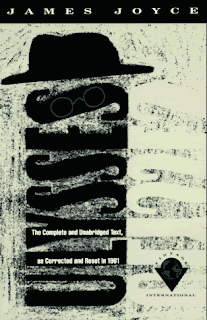James Joyce's Ulysses, a Human Work for Humans
"Ulysses is difficult. It is also profoundly human and accessible. Famously, Joyce has Leopold and Molly Bloom and Stephen Dedalus at the core of the story, and countless Dublin denizens radiating outward, echo , engage and collide with themes of Homer's Odyssey. He also roars them through ORDINARY LIFE on June 16, 1904, as WE are roared through it. In it, fear, memory, grief, food, sex, fights, fireworks, birth, death, affirmation crackle to life in language that Joyce makes at once celebrate and summon to consciousness our OWN experiences, art that has gone before (Shakespeare, Chaucer, Bunyan, Yeats, Mozart, Synge), and startling discoveries of most human capabilities." (Claudia Traudt, from the introduction to the lecture)
This morning I attended a lecture by Claudia Traudt in the "First Friday Lecture Series" of the Basic Program of Liberal Education for Adults. It was called a lecture but the experience was more like a celebration of the humanity of literature as demonstrated by James Joyce in his novel Ulysses.
The celebration began with a simmering and a glimmering, with the percolation of ideas and concepts that represent in some small way the nature of Joyce's work of literary genius. Claudia began by asking a simple question about Ulysses: Is this for Humans? The answer was an emphatic Yes! But why, when almost everyone in the audience and many others who have read Ulysses would say it is "difficult"?
Perhaps it is a difficulty that is an inescapable aspect of the human condition and as such, when presented as literature, is accessible to humans.
Perhaps it is a difficulty that may be overcome by simply reading the text, enjoying the story, and waiting for the moments, christened "Eureka" moments by Claudia, where the text will become more understandable, part of your soul, if not less difficult. It reminded me of my own experience reading William Faulkner's The Sound and the Fury, another notoriously difficult book. After at least three readings and countless partial attempts one summer I found myself finally "in the zone" with the text suddenly alive and the voices of the characters, their streaming consciousnesses, clearer than ever before. Eureka!

This takes work and both serious reading of and listening to the text. It is a text that echoes and reechoes Homer's Odyssey. One example of this jumped out at me when references to the sea from Ulysses brought to my mind the image of Odysseus sitting on the shore of Calypso's island pining for his home.
Most of the lecture that followed was a presentation of key examples from the text of the novel with intelligent and impassioned commentary by Claudia. From the relative straightforward approach of Episode 7, known as "Aeolus" with its short sections demarcated by headlines to the soliloquy of Molly Bloom in Episode 18 with its run-on sentences, we luxuriated in the prose of Joyce that had many reaching for their dictionaries (and realizing that the handy portable dictionary they might be carrying with them was not up to the task of deciphering the relatively recondite prose of Joyce).
The lecture concluded with great joy and appreciation for the reassurance of the lecturer that Joyce's Ulysses is indeed "a Human Work for Humans".
Ulysses by James Joyce. Random House: Vintage Books, 1990 (1934)

No comments:
Post a Comment